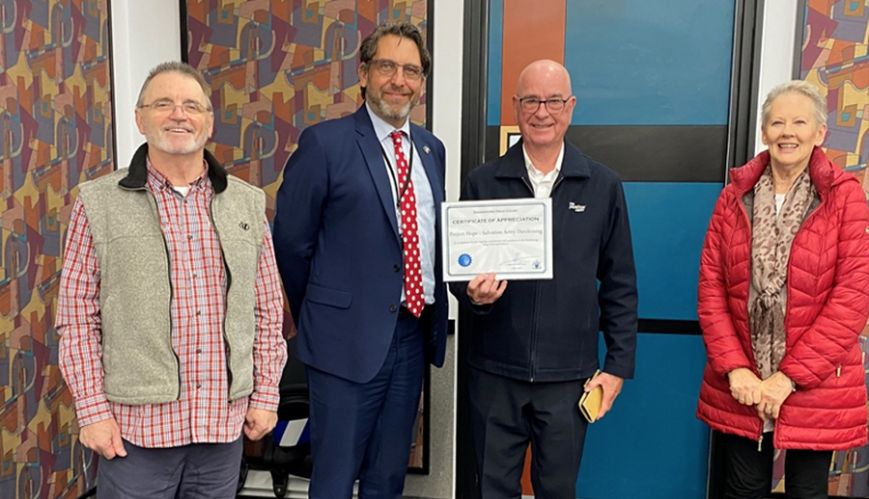Building bridges to drug and alcohol recovery

Building bridges to drug and alcohol recovery
Chief Magistrate Gerard Bryant (second left) presents Major John Farquharson with a certificate of special appreciation for the work of The Salvation Army’s Building Bridges program. Mike McKenzie (left) and Terry McNab (right), program counsellors, also attended the presentation.
Jason* has spent 16 years of his life in prison and was addicted to heroin. After completing two cycles of The Salvation Army Building Bridges recovery program he is rebuilding his life and has been clean for a significant period. Jason is currently studying for Alcohol and Other Drugs Counsellor certification.
Kate completed two cycles of Building Bridges – the second through telephone delivery under COVID-19 restrictions. She spoke about being treated with respect throughout the program and having her dignity upheld by the way she was encouraged, but also held accountable.
The Victorian Drug Court, based at the Dandenong Magistrates Court, recently recognised staff from the Building Bridges program for the impact they are consistently having in the lives of the program’s participants – people such as Jason and Kate.
Chief Magistrate Gerard Bryant presented Program Manager Major John Farquharson, and facilitators Mike and Terry, with a special certificate of appreciation and praised the “real change brought about by real relationships and accountability” through Building Bridges.
The Police Prosecutor also spoke highly of the “significant gap” Building Bridges filled, and the role it played in the court program of assisting the clients to rebuild their lives.
The Salvation Army’s “Project Hope” at Dandenong runs Building Bridges to assist those in the local area battling drug and alcohol addictions. It’s an evidence-based day therapeutic recovery program, adopted from Victoria’s Bendigo’s social mission program, co-located with the Bendigo Corps, where it was designed, developed and practised, with impressive results.
The eight-week program is run under the auspices of the Dandenong Corps and in partnership with The Salvation Army National Alcohol and Other Drugs stream, led by Kathryn Wright.
Unexpected donation
Building Bridges is currently funded from an extremely generous, and totally unexpected, donation.
In December 2018, John was in his office when a man came to the door wanting to make a donation. John got out the receipt book and glanced at the cheque the man had given him – made out for $500,000!
“This is only something you read about happening and I couldn’t believe it at first!” said John. But it was real. The donor, who wanted to remain anonymous, had been through The Salvation Army Bridge program years ago, had done well in life, and wanted to do something for drug and alcohol addiction in this area of Melbourne.
“Our funding for Support and Recovery Services was due to run out a few months later, so we were so thankful for the donor’s generosity,” said John.
John officially retired on 30 April 2018 but came out of retirement the very next day to manage the program on a part-time basis. “I don’t believe in retirement,” he said. “I get great meaning from engaging with people and community and seeing lives changed.”
Program design
Building Bridges is a holistic program based on helping participants work towards recovery and optimal health physically, mentally, emotionally and spiritually.

“The concept behind it is that most people who are misusing substances don’t want to be but haven’t had the skills to make a better choice in life,” explained John. “So we look at helping them develop skills to make wiser choices.
“Most importantly, we believe that every person is a human being created in the image of God and deserves to be treated with dignity and respect. We all battle with different issues, some of us just manifest them in different ways.”
Spiritual awareness is a key dimension of the program and is included in the teaching and discussions around social, emotional and physical health.
“We help the participants understand that there is a higher power; something bigger than us,” said John. “It’s about understanding grace and forgiveness, kindness, gratitude and serving others. These are the critical elements of spiritual life and universal to religion.”
In non-coronavirus times, the program consists of group therapy, one-on-one interviews and case management. During the pandemic, this has been managed online and through phone conversations. As restrictions begin to ease, the program has commenced with fewer participants, shorter sessions, and with social distancing and additional hygiene measures in place.

Participants come from all walks of life and are referred by the Magistrate’s Court across the road, the Drug Court, solicitors and the participants themselves.
“We have a strong relationship with the Drug Court,” said John. “By attending a course like Building Bridges, clients get credits that will help them in avoiding potential prison sentences, and in the rehabilitation and recovery supervised by the Drug Court.”
As well as counsellors Terry and Mike, volunteers – several of them former program participants – play a key role in the program. Under supervision, three Masters of Counselling students from Monash University also work with program participants, as well as in Project Hope’s additional groups such as counselling, anger management, the Positive Lifestyle Program and Men’s Behaviour Change sessions.
“All of the programs here are about the same thing – helping people develop skills to cope with the issues that have caused them to stumble in life,” said John.
Day model
A day model for the program, rather than residential services, was chosen for Building Bridges.
“Residential suits a lot of people, but not everyone,” said John. “In a local day program, people can get on with their daily lives and responsibilities and learn to cope in the situation they are living in.
Being based at a local corps but having strong links with The Salvation Army Alcohol and Other Drugs stream, also allows consistent standards of practice to be maintained and developed.
“Building Bridges is an exciting and unique program that, as we develop it further, can be a good model for corps-based programs in the future,” said Kathryn Wright, General Manager, Alcohol and Other Drugs.
“We want to offer a variety of treatment options and provide a continuum of care, so it’s important to have both residential and community-based programs available.
“All our programs encourage fullness of life and building a healthy lifestyle away from substance misuse. They also show how the different departments of The Salvation Army work together for the best outcome for our clients.
* Names have been changed.